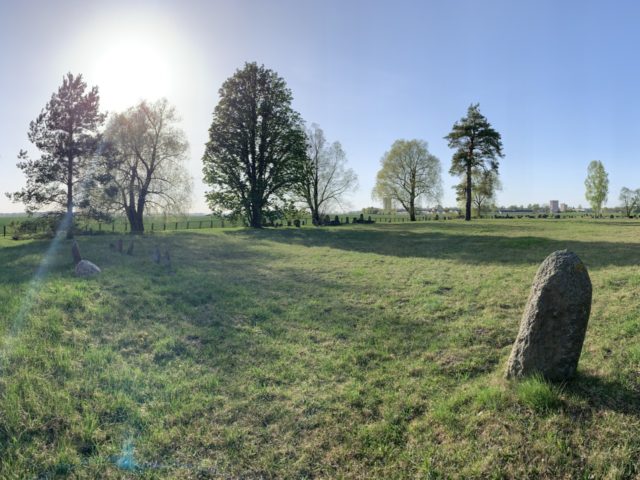There is hardly a pastoral landscape in the world as beautiful as Lithuania’s in the springtime. Though the land is flat, it bursts forth in color — bright green fields and white blossoms underneath an endless blue sky, rustic hamlets strung along the quiet roads, frozen in time.
And yet if you look up the names of those hamlets, you will find that each of them, still within living memory, once had a Jewish population that was brutally murdered in late 1941.
The Holocaust began in Nazi Germany, but the “Final Solution” began in Lithuania. After centuries in which Jews and Lithuanians had lived side-by-side, with Lithuania becoming a hub of Jewish intellectual and cultural life, the local authorities carried out Nazi orders to round up their Jewish neighbors, force them to become slave laborers, and then execute them, often by shooting them into mass graves. The verdant forests of Lithuania are full of them.
As historian Timothy Snyder, author of Black Earth: The Holocaust as History and Warning, noted recently, more victims of the Holocaust were shot than murdered in gas chambers.
The public imagination is fixed on the horrors of Auschwitz and Birkenau, the site of this week’s annual “March of the Living,” where mass murder became an industrial process and science was twisted into inhumane torture. Such death camps are a rebuke to modernity.
What happened in Lithuania was just as modern in its causes, but less so in its methods. Many of the murderers knew the neighbors they were killing. The Lithuanian Holocaust foreshadows the Rwandan genocide, with guns rather than machetes, warning us that decent, ordinary people can be manipulated into suspending every moral principle, every personal emotion, under the extreme conditions of war, statelessness, prejudice, and propaganda.
It is difficult, and perhaps impossible, to understand fully what happened in Lithuania and in neighboring countries during that first part of the “Final Solution.” But any attempt to explain it must consider two factors.
First there is the presence of pre-existing prejudice against Jews, sometimes spread within a religious context. Despite the pro-Israel stances of Lithuania, Poland, and other young democracies in the region; even despite the recent election in Ukraine of the country’s first Jewish president; this folk antisemitism occasionally surfaces, even today. That is not to judge these countries — recent events in the U.S. make such judgments impossible — but merely to state a fact.
Second, it is hard to understand the Lithuanian phase of the Holocaust without first understanding that the populace had endured a year of brutal Soviet occupation before the Nazis arrived. The USSR crushed a newborn Lithuanian nation and deported tens of thousands of people, especially intellectuals and leaders. Jews were among the victims: my grandfather’s cousin, Yechezkel Pulerevitch, was arrested and exiled from Lithuania for being a Zionist.
The Nazis cruelly and brilliantly exploited these events to win the support of nationalists in Lithuania and in other eastern European states — and urged them to see the Jews, collectively, as the symbols of the hated Soviet regime.
It was the toxic combination of left- and right-wing intolerance for Jews, coupled with pre-existing prejudice, that enabled the Holocaust in Lithuania. And that is a lesson easier to relate to, perhaps, than the extraordinary horrors of the death camps.
In the U.S. today, the extreme left and right are echoing each other in denouncing Jews, usually through anti-Israel fanaticism. That does not mean a Holocaust is imminent. But it creates a context for violence.
Though landscape of rural Lithuania looks much as it did a century ago, Lithuania today is a very different place. After emerging from decades of communism, Lithuania is a forward-looking country, with a healthy economy and an optimistic outlook. A new generation of Lithuanians is curious about their country’s history, asking questions that were suppressed by the USSR, which explained the Holocaust as something German fascists did to Soviet citizens.
The small town where my late grandfather was born, Joniškis, has restored its two strikingly beautiful synagogues. Local volunteers have eagerly helped me trace my roots, and discover my great-grandfather’s grave. On my visits, we have not avoided difficult topics; we have wrestled with them, together. These new relationships give me hope.
But Lithuania’s past is more relevant now than ever. As painful as it is, we cannot forget its lessons for the world.
Joel B. Pollak is Senior Editor-at-Large at Breitbart News. He is a winner of the 2018 Robert Novak Journalism Alumni Fellowship. He is also the co-author of How Trump Won: The Inside Story of a Revolution, which is available from Regnery. Follow him on Twitter at @joelpollak.

COMMENTS
Please let us know if you're having issues with commenting.